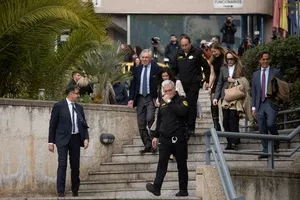The precious finds were unearthed in Velia, a powerful Greek colony and important city during the birth of Roman civilization.
Now part of the town of Ascea in the southern region of Campania, Velia is located 40 kilometers southeast of Paestum, famous for some of the best-preserved ancient Greek temples in the world.
Experts believe the helmets, which were found in good condition, and metal fragments date to the Battle of Alalia in 540 BC, when a Greek force of Phocaean ships clinched victory over the Etruscans and their Carthaginian allies in a bloody naval battle off the coast of Corsica.
One of the helmets is thought to have been taken from the enemies.
The excavations at Velia also unearthed the remains of walls of a temple and vases with the Greek inscription “sacred”.
The relics were discovered on what would have been the acropolis, or upper part, of the ancient Greek city.
Massimo Osanna, the director general of Italian museums, said the site probably contained artefacts of offerings made to Athena, the ancient Greek goddess of wisdom, after the Battle of Alalia.
After the battle, the Greek colonists set sail for southern Italy, where they bought a piece of land and founded Velia.
Velia formed part of Magna Graecia, which referred to the southern Italian coastal areas colonised by the Greeks.
Velia was the birthplace of the distinguished Greek philosopher, Parmenides.
Italian Culture Minister Dario Franceschini hailed the find, stressing the importance of “continuing to invest with conviction in archaeological research that keeps yielding major pieces of the history of the Mediterranean”.
Franceschini last week named Tiziana D’Angelo the new director of Paestum and Velia archaeological park.
At the age of 28, D’Angelo is among the youngest directors of a leading Italian cultural site.
She takes over the role from Gabriel Zuchtriegel, who now manages Pompeii.



























